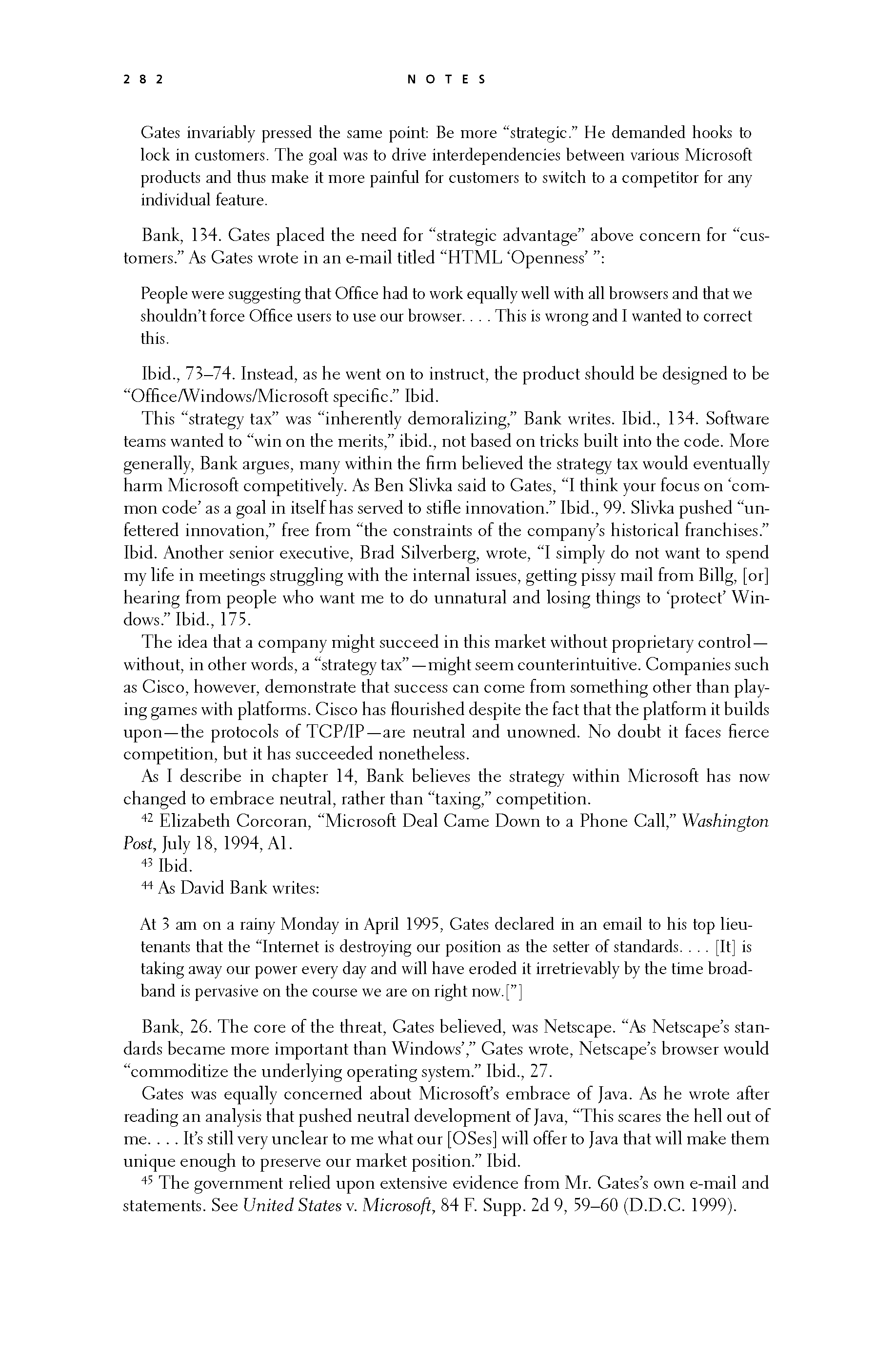 p281 _
-chap- _
toc-1 _
p282w _
toc-2 _
+chap+ _
p283
p281 _
-chap- _
toc-1 _
p282w _
toc-2 _
+chap+ _
p283
____ Gates invariably pressed the same point: Be more "strategic." He demanded hooks to
____ lock in customers. The goal was to drive interdependencies between various Microsoft
____ products and thus make it more painful for customers to switch to a competitor for any
____ individual feature.
Bank, 134. Gates placed the need for "strategic advantage" above concern for "cus-
tomers." As Gates wrote in an e-mail titled "HTML 'Openness'":
____ People were suggesting that Office had to work equally well with all browsers and that we
____ shouldn't force Office users to use our browser... This is wrong and I wanted to correct
____ this.
Ibid., 73-74. Instead, as he went on to instruct, the product should be designed to be
"Office/Windows/Microsoft specific." Ibid.
This "strategy tax" was "inherently demoralizing," Bank writes. Ibid., 134. Software
teams wanted to "win on the merits," ibid., not based on tricks built into the code. More
generally, Bank argues, many within the firm believed the strategy tax would eventually
harm Microsoft competitively. As Ben Slivka said to Gates, "I think your focus on 'com-
mon code' as a goal in itself has served to stifle innovation." Ibid., 99. Slivka pushed "un-
fettered innovation," free from "the constraints of the company's historical franchises."
Ibid. Another senior executive, Brad Silverberg, wrote, "I simply do not want to spend
my life in meetings struggling with the internal issues, getting pissy mail from Billg, [or]
hearing from people who want me to do unnatural and losing things to 'protect' Win-
dows." Ibid., 175.
The idea that a company might succeed in this market without proprietary control --
without, in other words, a "strategy tax" -- might seem counterintuitive. Companies such
as Cisco, however, demonstrate that success can come from something other than play-
ing games with platforms. Cisco has flourished despite the fact that the platform it builds
upon -- the protocols of TCP/IP -- are neutral and unowned. No doubt it faces fierce
competition, but it has succeeded nonetheless.
As I describe in Chapter 14, Bank believes the strategy within Microsoft has now
changed to embrace neutral, rather than "taxing," competition.
[4-42] Elizabeth Corcoran, "Microsoft Deal Came Down to a Phone Call," _Washington_
_Post,_ July 18, 1994, A1.
[4-43] Ibid.
[4-44] As David Bank writes:
____ At 3 am on a rainy Monday in April 1995, Gates declared in an email to his top lieu-
____ tenants that the "Internet is destroying our position as the setter of standards... [It] is
____ taking away our power every day and will have eroded it irretrievably by the time broad-
____ band is pervasive on the course we are on right now.["]
Bank, 26. The core of the threat, Gates believed, was Netscape. "As Netscape's stan-
dards became more important than Windows'," Gates wrote, Netscape's browser would
"commoditize the underlying operating system." Ibid., 27.
Gates was equally concerned about Microsoft's embrace of Java. As he wrote after
reading an analysis that pushed neutral development of Java, "This scares the hell out of
me... It's still very unclear to me what our [OSes] will offer to Java that will make them
unique enough to preserve our market position." Ibid.
[4-45] The government relied upon extensive evidence from Mr. Gates's own e-mail and
statements. See _United_States_ v. _Microsoft,_ 84 F. Supp. 2d 9, 59-60 (D.D.C. 1999).
[[282]]
p281 _
-chap- _
toc-1 _
p282w _
toc-2 _
+chap+ _
p283